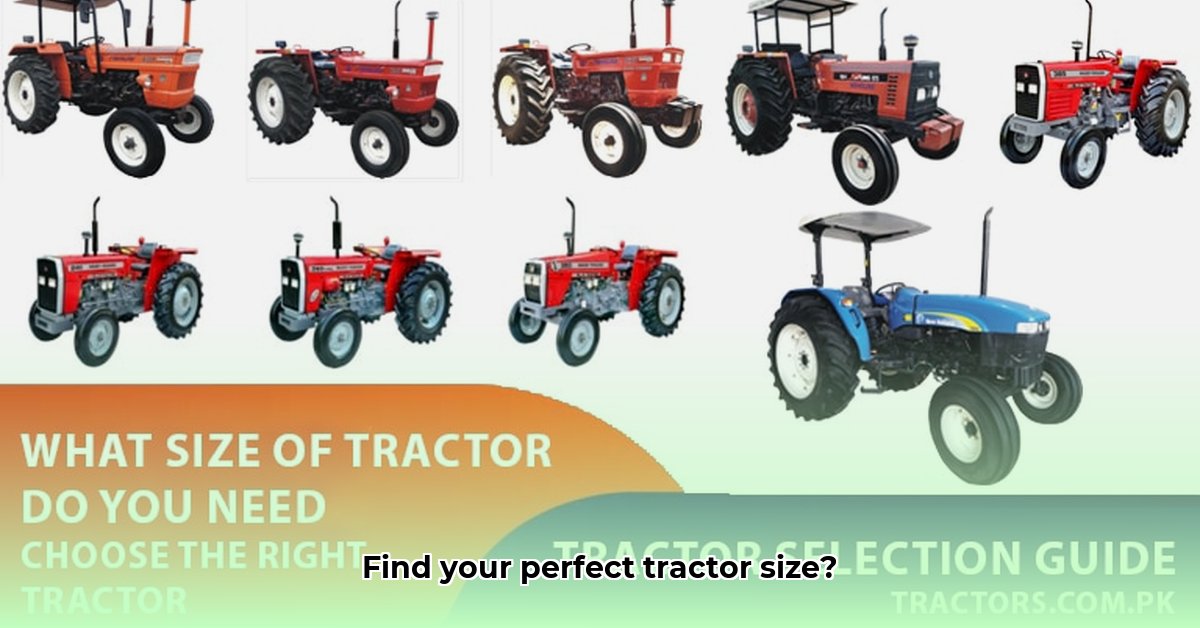
Understanding Your Farming Operation: The Foundation for Tractor Selection
Before selecting a tractor, thoroughly assess your farming operation. What type of farming do you conduct? How many acres do you manage? What are your primary tasks—plowing, planting, harvesting, or hauling? These factors fundamentally influence your tractor needs. A small vegetable farm requires a vastly different tractor than a large-scale grain operation. Consider it like choosing the right tool: you wouldn't use a sledgehammer to drive a nail, would you? This initial assessment is crucial for making an informed decision. What are your farm's unique requirements?
Decoding Tractor Sizes: Beyond Horsepower
Tractor size isn't solely defined by horsepower. While horsepower is a key factor, consider these categories:
Sub-compact Tractors: Ideal for small gardens, hobby farms, or limited acreage. They offer excellent maneuverability and fuel efficiency, perfect for tight spaces and smaller tasks.
Compact Tractors: These balance power, maneuverability, and fuel efficiency, suitable for a wider range of tasks and slightly larger acreages.
Utility Tractors: The workhorses—powerful enough for larger fields and heavier equipment. They represent a significant investment, but handle larger tasks efficiently.
Large Tractors: Designed for massive-scale operations with extensive fields and heavy machinery. These behemoths offer immense power but come with higher costs and fuel consumption.
Important Note: Weight is as critical as horsepower. Greater weight provides stability but increases the risk of soil compaction. Always consult the manufacturer's specifications; they vary considerably across brands and models. How will weight impact your soil health?
Matching Tractor to Farm Acreage: A Practical Guide
This table provides general guidelines for tractor size based on farm acreage. Your specific needs may vary; remember your typical tasks and the size of your equipment.
| Farm Size (Acres) | Suggested Tractor Class | Considerations |
|---|---|---|
| Under 5 | Sub-compact | Maneuverability and fuel efficiency are paramount. |
| 5-20 | Compact | Balance of power and maneuverability is crucial. |
| 20-50 | Utility | More power is needed for heavier implements and larger fields. |
| 50-100 | Utility or Larger | Assess specific needs and the size of your equipment. |
| Over 100 | Large or Specialized | Heavy-duty tractor and specialized equipment may be required. |
Sustainability: Fuel Efficiency and Soil Health
Sustainable farming considers the land's impact. Larger tractors consume more fuel, increasing emissions and your carbon footprint. They also risk soil compaction, harming soil structure and reducing water and nutrient retention. Smaller tractors are often the more environmentally sound choice.
Fuel Efficiency: Monitor gallons per acre (GPA). Lower GPA indicates better fuel efficiency and lower costs. What fuel efficiency targets do you aim for?
Soil Compaction: Lighter tractors minimize compaction. However, even with smaller tractors, wider tires distribute weight more evenly, reducing compaction. How can you mitigate soil compaction on your farm?
Precision Farming: Optimizing Resource Use
Precision agriculture technologies, such as GPS-guided equipment, minimize overlapping passes, saving fuel, time, and seeds. These technologies are compatible with smaller tractors, enabling efficient operation even on smaller farms. How might precision agriculture technologies improve your efficiency?
Your Step-by-Step Guide to Tractor Selection
Analyze Your Needs: Evaluate your farm size, crops, tasks, and budget. Be realistic about your tractor's function.
Research: Explore tractors from various manufacturers, comparing specifications and reviews.
Compare Specs: Closely examine horsepower, weight, fuel efficiency, and features. Consider the size and weight of the implements you'll use.
Budget: Include the purchase price, maintenance, fuel, and repairs.
Test Drive: If possible, test drive models in your field to assess their handling.
Choose: Select the tractor that best meets your needs, budget, and sustainability targets. There's no single "perfect" tractor—the best one is the one that works best for you.
Choosing a tractor is a significant long-term commitment. Careful consideration will lead to a choice that supports sustainable, efficient, and profitable farming practices for years to come. Stay informed about advancements in tractor technology, including new designs that minimize environmental impact. What are the long-term implications of your tractor choice?